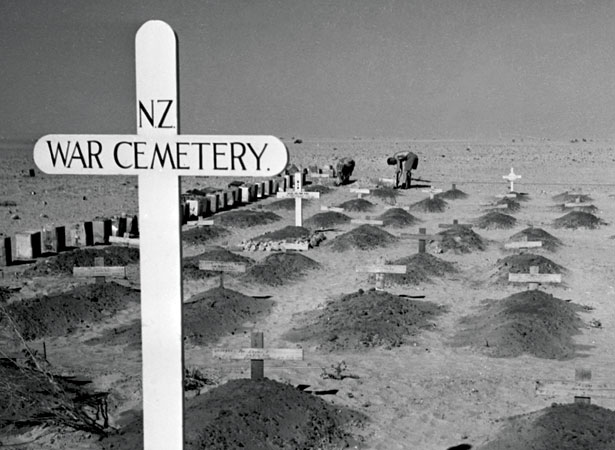
At El Alamein in Egypt, 2 New Zealand Division opened the way for British tanks, allowing the Allies to make a breakthrough and force the Axis forces in North Africa to retreat.
The North African campaign was vital to the Allied cause because of the strategic importance of the nearby Suez Canal and the Middle East oilfields. The New Zealanders had been fighting German and Italian forces across the border between Egypt and Libya since late 1941.
The Second Battle of El Alamein, which began on 23 October 1942, was to determine the outcome of the Western Desert campaign. Allied infantry, including the New Zealanders, opened the attack. They seized most of their initial objectives, but battlefield congestion, poor coordination and cautious leadership prevented Allied armoured units from taking advantage of gains made by the infantry.
Disappointed by the lack of progress, Allied commander Lieutenant-General Sir Bernard Montgomery planned a second major attack – Operation Supercharge – further south. 2 New Zealand Division, boosted by two British infantry brigades, was given the responsibility of leading this attack, which began at 1.05 a.m. on 2 November. The aim was to destroy as many enemy tanks as possible and clear the way for Allied armour to break through. An air offensive preceded the advance on the ground, which was supported by an artillery barrage in which nearly 350 guns fired more than 50,000 rounds.
Fighting during the day was fierce, but by evening the German Afrika Korps was in a desperate position. With many of his tanks destroyed and fuel supplies low, Field Marshal Erwin Rommel began withdrawing the mobile parts of his army. By 4 November it was in headlong retreat, with the British armoured divisions and 2 New Zealand Division in hot pursuit. Lacking transport, thousands of Italian and German troops were taken prisoner. While Rommel lived to fight another day, there was no hiding the fact that the Axis had suffered a decisive defeat.
Read more on NZHistory
El Alamein – The North African CampaignBernard FreybergHoward Kippenberger – The Battle for CreteHoward Kippenberger
External links
How to cite this page
'2 New Zealand Division leads breakthrough at El Alamein', URL: https://nzhistory.govt.nz/operation-supercharge-2-new-zealand-division-helps-in-decisive-breakthrough-at-el-alamein, (Ministry for Culture and Heritage), updated 9-Sep-2020
